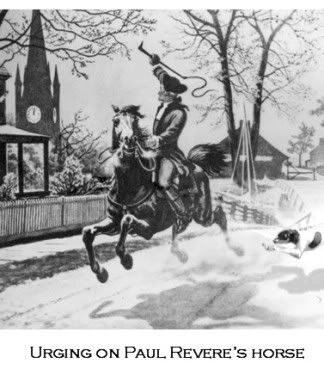 On this day in 1775, the British Army under the command of Lt. Colonel Francis Smith ordered his army of some 700+ to attack and seize the colonial armaments being stored at Concord. In response, the Boston Minutemen rallied in defence of their "nation," claiming that the British had finally crossed the proverbial line in the sand. The brave rabble of American militiamen who bravely stood against the British have been hailed for their bravery as they stood against the might of the British Army. As Ralph Waldo Emerson stated in his epic poem that has forever immortalized this battle:
On this day in 1775, the British Army under the command of Lt. Colonel Francis Smith ordered his army of some 700+ to attack and seize the colonial armaments being stored at Concord. In response, the Boston Minutemen rallied in defence of their "nation," claiming that the British had finally crossed the proverbial line in the sand. The brave rabble of American militiamen who bravely stood against the British have been hailed for their bravery as they stood against the might of the British Army. As Ralph Waldo Emerson stated in his epic poem that has forever immortalized this battle:By the rude bridge that arched the flood,
Their flag to April's breeze unfurled,
Here once the embattled farmers stood
And fired the shot heard round the world.
Though nobody can doubt the boldness of this British advancement, several historians have begun to question whether or not the battles of Lexington & Concord have received too much attention and credit. While nobody will deny that the battle was both vicious and brave for the colonials, one has to question why this battle is given the unique distinction as being the "beginning battle" to the American Revolution.
First off, I want to make it clear that I am in no way trying to discredit the heroism or significance of the Battle of Lexington & Concord. Instead, I believe that we should strive to put it into the context in the manner that its contemporaries understood it. By doing so, we can learn and appreciate the TRUE nature and importance of this battle.
As far as our Founding Fathers were concerned, the Battle of Lexington and Concord was but another British atrocity that demanded a response. The measure and severity of that response, however, was a topic of great debate between the several delegates to the Continental Congress. Understandably, the Massachusetts delegates demanded war, while many others demanded a peaceful response. War was never officially declared by the Congress, though they did manage to officially appoint George Washington to be the General of the newly established Continental Army. This, however, came AFTER the battle.
It is also important to note that very few of Massachusetts's sister colonies were making preparations for war. As far as they saw it, peace was still very much a possibility and hope. There was also no official declaration for independence, nor any new form of government established. Clearly, our Founding Fathers understood the atrocity of Lexington and Concord to be a serious problem, but not necessarily an act of war.
